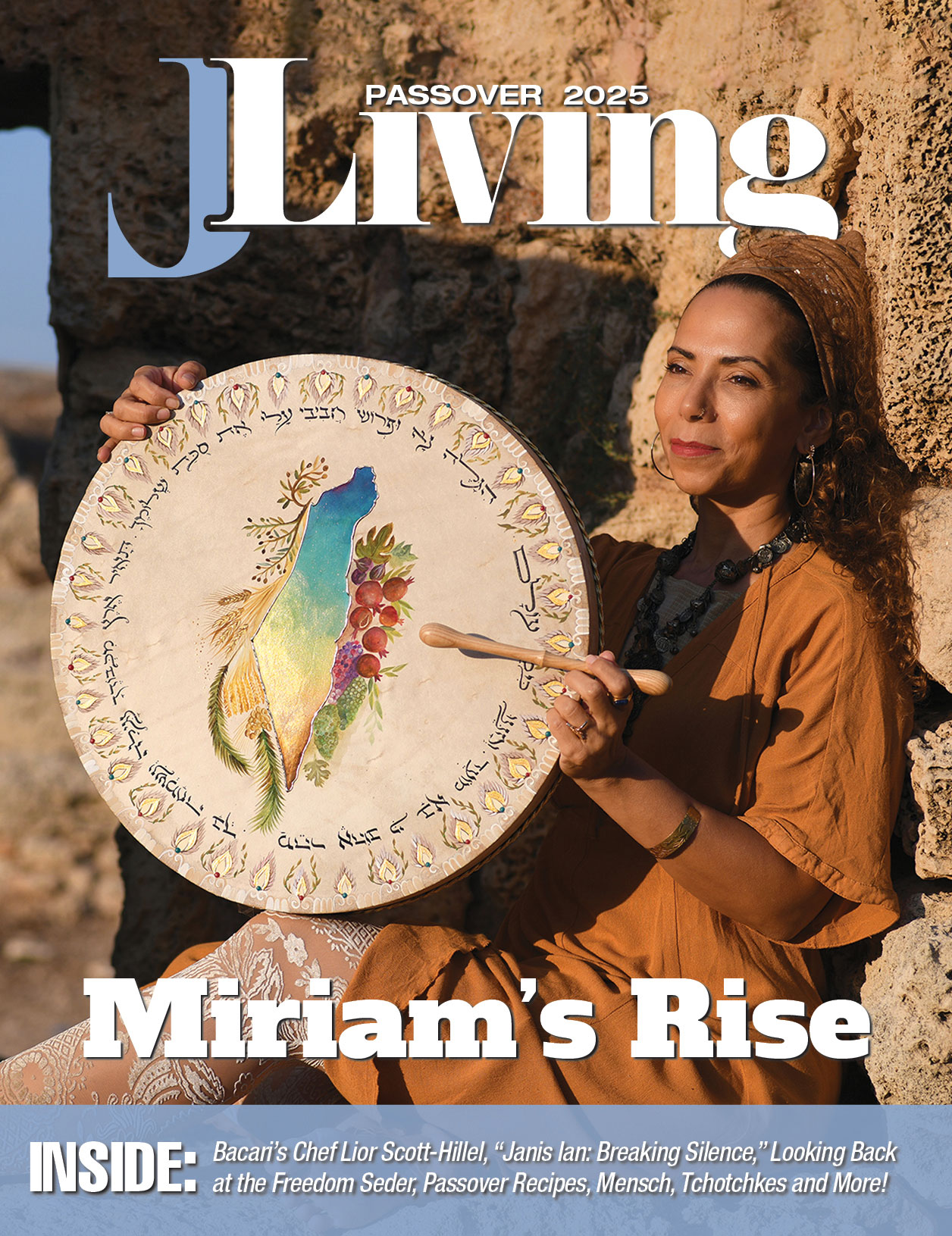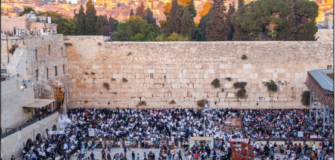An Inclusive Israel

Cory Lee was disappointed he wouldn’t be able to immerse himself in the Dead Sea’s famously buoyant waters during his first trip to Israel in 2016. “There was a beach wheelchair, but no accessible changing room,” he said. “I could have gotten in the water, but I would have been wet all day.”
Lee, a powered wheelchair user since age 4, when he was diagnosed with Spinal Muscular Atrophy, covers accessible travel through his blog Curbfree with Cory Lee. His Dead Sea experience wasn’t a shock — Lee fully expected Israel, an older country, to be difficult to get around. However, he was pleasantly surprised to find accessible paths in the Old City and in Nazareth. And his Tel Aviv beach experience redeemed the Jewish State. “Tel Aviv has some of the most accessible beaches in the world…They’re working on making Israel inclusive of all travelers with disabilities,” he said.
According to Israel’s Equal Rights Commission Report for 2017, 1.4 million people with disabilities live in Israel, constituting more than onefifth of the adult population. And yet people with disabilities were largely unseen in Israeli society prior to the 1970s, said Gordon Couch, author of the travel guide “Access in Israel: A Guide for People Who Have Problems Getting Around” (Peter Collin Publishing, 2000).
Couch’s foray into accessible tourism began in the 1960s as a volunteer with a London school for youth with disabilities, taking students on trips through Great Britain and then to countries like France, Italy, Greece and Israel. After writing accessibility guides for London and Paris, Couch penned his first Israel guide in 1980, which included a map of how to best tour Jerusalem. “There were no other disabled [individuals] other than visitors in those earlier days,” he said. “What we discovered slowly is the veterans were very well looked after behind four walls, out of sight.”
While he witnessed progress in the 30 trips he took to Israel until about 2010, Couch said change was sporadic in terms of accessibility and societal attitudes toward individuals with disabilities.

The growth of accessibility — and accessible tourism, by extension — in Israel is a relatively recent phenomenon that followed the Knesset’s passage of the Equal Rights for People with Disabilities Law in 1998, which ensured accessibility in spaces and public services, including cultural, entertainment, health, hospitality, religious, sports, telecommunications and tourism services. A variety of initiatives followed in the law’s wake, which helped increase public awareness of accessibility issues in Israel.
In 1999, Yuval Wagner, an Israeli Air Force pilot who was injured in a helicopter crash that left him a quadriplegic, founded Access Israel, the nation’s first nonprofit to promote accessibility and inclusion of people with disabilities. The organization promotes legislation, holds trainings, fields complaints, and promotes accessibility in education and tourism. Its website (aisrael.org) features a wealth of information for residents and tourists alike.
In keeping with the spirit of Israel as the Start-Up Nation, Lioz Amar, who was injured during his IDF service and requires a wheelchair for mobility, founded Travaxy — a portmanteua of “travel” and “accessibility” — in 2016 to support people with disabilities or general mobility issues with travel planning. A business-to-business interface, Travaxy provides travel agents with up-to-date accessibility travel information about airlines and hotel accommodations.

The country is increasingly attuned to the need for accessibility at heritage and nature sites, said Deb Zaluda, chief growth officer with accessible tour operator Israel4All. She points to the Ayalon Institute Museum in Rehovot, a secret underground ammunition factory from the time of the British Mandate, which until recently was only accessible by stairs. In June, the institute celebrated the availability of a new elevator.
Israel is actively working to apply the principles of universal access as it adapts its ancient sites and improves new developments to ensure the accessibility of its own citizens as well as for tourists. Richard Liverance, marketing director for Israel Ministry of Tourism’s Western Region, said that Israel is making improvements at major heritage sites in Jerusalem, such as the Western Wall complex, the Via Dolorosa and the Church of the Holy Sepulchre, to increase accessibility for people with limited mobility.
Israel’s Nature and Parks Authority is working to upgrade accessibility and provide access aids for all of its national parks, nature reserves, antiquity and heritage sites. Eli Meiri, an experienced tour guide and founder of Israel4All, said that the shutdown during COVID provided Israel’s national parks with a prime opportunity to work on accessibility. “It doesn’t mean that every trail will be accessible,” he said. “You have to know what you want to see before you visit.” An interactive online map available on the Access section of the Nature and Parks Authority webpage (parks.org.il) details which national parks and nature reserves feature accessibility, and what amenities are and are not available at each site.

Transportation has improved as well. According to Access Israel’s Accessible Vacation Guide, options include rental cars, trains, city busses, and accessible transportation services (e.g., dedicated vans and busses). However, intercity busses and vans are not yet accessible.
While Israel has made great progress, barriers still exist. Howard Blas, director of National Ramah Tikvah Network, has lead multiple Birthright Israel missions to Israel for individuals on the autism spectrum. He says one of the biggest barriers in accessible travel is the attitude that doing a little is enough. “There’s a gap between what people say is accessible and what is accessible.” It could be a broken elevator, busses that pass by a person with a disability, and NIMBYism within Israeli society when it comes to special needs, Blas said.
Many popular heritage sites and parks remain difficult to maneuver with wheelchairs, thus limiting access, Israel Tourism’s Liverance said. “Only about half of the public buildings and spaces through the country offer accessible entry.”
Meiri, believes that knowledge is one of the greatest barriers in accessible tourism. He recommends doing as much research as possible beforehand to determine what accommodations exist. .

“The Israel Museum in Jerusalem, for example, made it very accessible. But places like the Shrine of the Book … the building is not very accessible, Traipse Traipse so people can barely see the Dead Sea Scrolls,” Meiri said. “Other places they’ve made it accessible, but there are small barriers, such as getting from one floor to another.”

On a hopeful note, as Israeli society continues to embrace and improve on accessibility, new trends in accessible tourism abound.
Following the COVID shutdown, Meiri predicts some tourists will be craving extreme sports in the form of wheelchair rappelling or accessible hot-air ballooning.
Lee got his first opportunity to ride in a hot-air balloon in Sde Boker with Over Israel (overisrael.co.il), which features an accessible basket with a door.
“We flew over the Negev Desert and it was one of the most incredible experiences of my life. Being able to go hotair ballooning as a wheelchair user wasn’t something I was ever expecting to do, and to do it in Israel was incredible,” he said.

As it continues to improve its own accessibility, Israel development as an accessible tourism destination has caught the attention of the travel industry. In 2018, travel industry insider TravelPulse rated Jerusalem among the top 25 disability-friendly cities in the world.
Lee, who made a second trip in 2017, says there’s still a lot of Israel left for him to explore. “I’ve gone to all of the popular spots, but I haven’t been to Southern Israel,” he said. “Eilat is pretty high on my bucket list. I’ve heard it’s very accessible.”
Having traveled both times with Israel4All, the one piece of advice Lee has for travelers with special needs or mobility issues: book with a company that features accessible tours.
“It takes a lot of the guesswork out of the planning,” he said. “Leave it to the experts.”
Adam Aviv, a former senior editor of The Jewish Journal and contributor to the Jerusalem Post, is a special-education teacher in Los Angeles.

Resources
Since many Israel tourism sites are ongoing excavation sites, getting around those locations can be challenging for travelers with disabilities, said Richard Liverance, marketing director for Israel Ministry of Tourism’s Western Region. Narrow, rocky paths or cobbled streets could present obstacles for travelers with mobility issues, so the tourism ministry recommends booking a trip with a certified tour operator that specializes in accessible tourism in Israel.
BIRTHRIGHT ISRAEL
Birthright Israel, which offers free trips to Israel for young Jewish adults ages 18-32, also features accessibility itineraries for individuals with a variety of medical, development, and physical dis[1]abilities, including Autism Spectrum Disorder, vision or hearing impairments, IBD and Crohn’s Disease, and participants who use wheelchairs.
Visit birthrightisrael.com
or call (888) 994-7723
SMARTRIP
Founded in 2008, accessible tourism is a cornerstone of SmarTrip’s mission. The Tel Aviv-based tour operator offers a variety of accessible packages, including Jewish heritage tours, Christian tours, tours for teens, as well as 7-, 8-, and 13-day tours of Israel.
Visit smartrip-israel.com or
call 972-3-5223622
ISRAEL4ALL
Israel4All specializes in accessible tourism for groups and individuals with disabilities and special needs, including hearing or visual impairment and those who walk at a slower pace.
Israel4All rents and hires equipment, such as wheelchairs, scooters, walkers, shower chairs, bath lifts, hoists, hospital beds, and portable oxygen concentrators; rents wheelchair-accessible vehicles; and maintains up-to-date information on accommodations at hotels, guest homes, apartments and youth hostels, among other facilities. For tourists whose cruise destinations includes Israel, Israel4all offers guided shore excursions from Ashdod and Haifa to destinations like Tel Aviv, Jerusalem and Galilee via a wheelchair-accessible vehicle.
Visit israel4all.com
or call 972-3-5188188
ELI MIERI
Accessible Tourism Israel
Eli has over 20 years’ experience working in accessible travel. He can create custom trips for families or groups traveling to Israel.
Contact e.meiri54@gmail.com
or call +972-50-6614455
ACCESS ISRAEL
Access Israel is the nation’s first nonprofit to promote accessibility and inclusion of people with disabilities. Its website also features an Accessible Vacation Guide that covers transportation; accessible trips and sites, hotels and tour guides; rental equipment; equipment repair services; medical centers; accessibility complaints, and essential phone numbers.
Visit aisrael.org
or call 972-9-7451126
YAD SARAH
Yad Sarah started in 1976, and 23 years later the organization grew to its current 120 branches, each featuring a lending center, and boasting more than 7,000 volunteers countrywide. Its primary mission is to provide Israeli individuals who are chronically ill, disabled, informed or terminally ill, from infancy to old age, with a range of medical equipment and healthcare support services for free or at a nominal cost to support independent living. These supports also include services for tourists, such as transportation, adaptive equipment (e.g., wheelchairs), oxygen cylinders or concentrators, and information from professional guides.
“Whatever the level of the person’s needs is, we can handle it,” said Adele Goldberg, executive director of Friends of Yad Sarah, which represents the Israeli organization’s mission in the United States. “A family will send us an itinerary, and they’ll get what they need delivered to each hotel along the way.”
Most tourist services feature nominal fees (e.g., deposit, delivery charges) and require oneto-four weeks advanced notice, depending on the service.
Visit yad-sarah.net
Also visit friendsofyadsarah.org
or call 866-923-7272



































